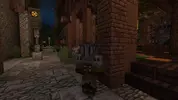- Joined
- Apr 2, 2016
- Messages
- 315
- Reaction score
- 491
- Points
- 0
The Chapter of Syfierni
Of the Pavisa Order
Ambience
Ambience
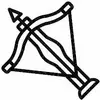
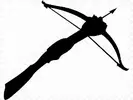
Con le mie braccia sante reprimerò da lontano i mormorii degli eretici.
Con i miei Bulloni di Fulmine e Legname, sconfiggerò i nemici delle tempeste di Tuono e combatterò valorosamente contro i nemici di Humanum.
I deboli non terranno più la paura mentre i miei vessilli svolazzano nella brezza montaniana.
Siamo uno strumento della rabbia dello Spirito e preghiamo affinché il grande Everwatch sia misericordioso verso i nostri nemici.
-Pavisa Prayer-Circa 306
Common Translation:
With thy holy arms I shall stay the hand of evil and the Heretical from afar.
With my Bolts of Lightning and Timber I shall vanquish the foes of the Thunderous storms.
The Weak will hold fear no longer hence my Banners flutter in the Montanian Breeze.
I am an Instrument of the Spirits Wrath, May the Great Everwatch be Merciful on our Foes.
-Pavisa Prayer-Circa 306
The History of the Chapter of Syfierni
The Chapter of Syfierni came around during the early months of the summer 307ac. The newly annointed Maestro of the Pavisa Order Corjah dei Termini set out to the Capital of the Empire at the behest of the Grand Maestro of the Order in the hopes that Maestro dei Termini would be able to set up a Chapter there and expand Possible Recruit sites for the Order as well as to showcase their prowess on the battlefield and assist in the present conflicts in the World that the Regalian Empire has their interests set. With conflicts consistently growing throughout the Noble Realms and the Pavisa Knights being held to a separate standard in the terms of how they are to act in the World, the Pavisa Knights of the Chapter of Syfierni range from Dressolini Tacticians to Dressolini Commanders of all variations, though of course utilizing the Pavisa as their primary weapon. Its name being Syfierni, is a combination of the Herons of Tacticians and Archers from the Unionist faith, that being Syferlin the Heron of Tacticians and Warin the Heron of Archers.
Current Chapter House
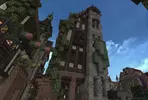
Pavisa Order Ranks
Maestro -Corjah dei Termini

The Master and Commander was the local commander in charge of the commandery — a small Pavisa "city" and stronghold. He had complete command in the field.
Seneschal
The Seneschal was the right-hand man for the Maestro and was sometimes called a Grand Commander. In peace, the Seneschal administered all the lands belonging to the chapter house. In war, he handled the movement of the men, the pack trains, the food procurement, and other issues of moving an army.
Marshal
The Marshal was in charge of all arms, as well as all horses. He was very much a military man, and a Master would usually consult with him, as well as the Seneschal before making any final decisions on tactics.
Under-Marshal
The first officer under the Marshal, the Under-Marshal was in charge of the lesser equipment, bridles, padding for saddles, barrels of water, and other supply problems. He held a very important position in battle because he held the piebald banner, a flag at the head of all, to keep stragglers together.
Syfierni Chapter Banner bearer
Also called the Confanonier, the Standard Bearer was in charge of the Squires (see below). He was their paymaster, their disciplinarian, and the man who checked over their very important work of keeping the knights' horses and weapons in good order. He didn't actually "bear the standard" in battle — he marched in front of the banner and led his marching column.
Pavisa Knight
The knight was the backbone of the battlefield. Knights were the most renowned Crossbowmen in Montania. A small force of knights was very powerful, skilled in warfare, clad in armor, able to take on a large number of foot soldiers at a distance and clear a wall with ease. Only a man whose locale province supported his rise towards becoming a Pavisa Knight had the chance to become one, and if he were caught failing the expectations, the penalty was severe. The knights dressed in the modest Dark and Lime green armoring patterns. There was no mistaking a Pavisa knight on the battlefield. Hair was cut short, but knights were forbidden to shave their Moustaches and beards, probably in keeping with the cultural norm that a moustache showcased dignified behavior and beard was a sign of greater masculinity. No sense giving your enemies a reason not to respect you.
Sergeant
Usually from a lower social class than the more noble knights, the Sergeant was still a line overseer, the chief support officer for the knight. Sergeants dressed in a Dark green tunic and a Lime green mantle, often with a Black crossbow symbol.
Treasurer
The Treasurer's duties are clear — this was the guy who kept the books.
Draper
The Draper was in charge of all the clothing and bed linen of everyone in the Order. He also had the power to oversee everyone of every rank, and to chastise them if their clothing was not proper for their position, or if anything decorated it, such as a collar of fur on a knight's white robe or mantle.
Squires
Squires were the young men who, just like in the movies, were there to assist the knight in any way possible, from polishing his weapons to feeding his horses. The difference for a Pavisa Squire is that this was often a hired position, especially in the first hundred years of the Order. It was only later that many Squires were there specifically to test themselves and their mettle and to climb to the order of Knight.
Lay Servants
Lay Servants could run the gamut, from masons brought in to do building or repair work to personal servants to an officer. The hierarchical statutes of the Pavisa Rule laid out precisely how many of such servants each officer was allowed to have. For a Pavisa to have too many would be a sin of pride.
Chaplain brothers
One of the most important positions within a Pavisa commandery was that of the Chaplain brother. The job came with many delicate layers of meaning. He was sort of the internal priest for the Order. He had the power to hear confessions and to give absolution for sins. In fact, Pavisas were forbidden to say their confession to anyone else without a proper consent from the Maestro of their specific Chapter.
Provincial Masters
Provincial Masters, who governed the western districts, were similar to the Commanders of Lands, but seem to have largely been responsible for managing revenue and recruiting new men to the Order.
Pavisa Offices
Pavisa offices were called baileys, meaning something entrusted to someone. It's the root word for the more familiar term of bailiff.
Maestro -Corjah dei Termini
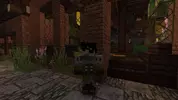
The Master and Commander was the local commander in charge of the commandery — a small Pavisa "city" and stronghold. He had complete command in the field.
Seneschal
The Seneschal was the right-hand man for the Maestro and was sometimes called a Grand Commander. In peace, the Seneschal administered all the lands belonging to the chapter house. In war, he handled the movement of the men, the pack trains, the food procurement, and other issues of moving an army.
Marshal
The Marshal was in charge of all arms, as well as all horses. He was very much a military man, and a Master would usually consult with him, as well as the Seneschal before making any final decisions on tactics.
Under-Marshal
The first officer under the Marshal, the Under-Marshal was in charge of the lesser equipment, bridles, padding for saddles, barrels of water, and other supply problems. He held a very important position in battle because he held the piebald banner, a flag at the head of all, to keep stragglers together.
Syfierni Chapter Banner bearer
Also called the Confanonier, the Standard Bearer was in charge of the Squires (see below). He was their paymaster, their disciplinarian, and the man who checked over their very important work of keeping the knights' horses and weapons in good order. He didn't actually "bear the standard" in battle — he marched in front of the banner and led his marching column.
Pavisa Knight
The knight was the backbone of the battlefield. Knights were the most renowned Crossbowmen in Montania. A small force of knights was very powerful, skilled in warfare, clad in armor, able to take on a large number of foot soldiers at a distance and clear a wall with ease. Only a man whose locale province supported his rise towards becoming a Pavisa Knight had the chance to become one, and if he were caught failing the expectations, the penalty was severe. The knights dressed in the modest Dark and Lime green armoring patterns. There was no mistaking a Pavisa knight on the battlefield. Hair was cut short, but knights were forbidden to shave their Moustaches and beards, probably in keeping with the cultural norm that a moustache showcased dignified behavior and beard was a sign of greater masculinity. No sense giving your enemies a reason not to respect you.
Sergeant
Usually from a lower social class than the more noble knights, the Sergeant was still a line overseer, the chief support officer for the knight. Sergeants dressed in a Dark green tunic and a Lime green mantle, often with a Black crossbow symbol.
Treasurer
The Treasurer's duties are clear — this was the guy who kept the books.
Draper
The Draper was in charge of all the clothing and bed linen of everyone in the Order. He also had the power to oversee everyone of every rank, and to chastise them if their clothing was not proper for their position, or if anything decorated it, such as a collar of fur on a knight's white robe or mantle.
Squires
Squires were the young men who, just like in the movies, were there to assist the knight in any way possible, from polishing his weapons to feeding his horses. The difference for a Pavisa Squire is that this was often a hired position, especially in the first hundred years of the Order. It was only later that many Squires were there specifically to test themselves and their mettle and to climb to the order of Knight.
Lay Servants
Lay Servants could run the gamut, from masons brought in to do building or repair work to personal servants to an officer. The hierarchical statutes of the Pavisa Rule laid out precisely how many of such servants each officer was allowed to have. For a Pavisa to have too many would be a sin of pride.
Chaplain brothers
One of the most important positions within a Pavisa commandery was that of the Chaplain brother. The job came with many delicate layers of meaning. He was sort of the internal priest for the Order. He had the power to hear confessions and to give absolution for sins. In fact, Pavisas were forbidden to say their confession to anyone else without a proper consent from the Maestro of their specific Chapter.
Provincial Masters
Provincial Masters, who governed the western districts, were similar to the Commanders of Lands, but seem to have largely been responsible for managing revenue and recruiting new men to the Order.
Pavisa Offices
Pavisa offices were called baileys, meaning something entrusted to someone. It's the root word for the more familiar term of bailiff.
IC Information
Currently the Order is headed by Maestro Corjah dei Termini who actively searches for more members of the Dressolini culture who are interested in assisting the Chapter of Syfierni and sending word to their families that the Order of Pavisa is expanding out to the Capital City of the Empire in search of more members who are interested in taking part. Generally speaking it would be very easy to make contact with the Maestro of the Chapter, if he is not actively around you'd simply have to speak to the Patriarch of House dei Termini to get in contact with him and soon a meeting shall be scheduled should you have any inquiries in regards to the Chapter.
Code of Ehren
- Honor is the highest virtue. Do not cheat, commit adultery, engage in dishonorable conduct, raise a weapon against the weak, old, poor or sick.
- Obedience to the Order is paramount. Do not speak ill of the Elders, the Code of Ehren, or the policies set by the Primae of the Order.
- To turn the other cheek is the highest class. Do not strike back with vile words, do not demean, and do not belittle others.
- To engage in self-effacement is the true sacrifice. Take no glory for one's actions, seek no affirmation or pedestal, and reject all that is Gold and Silver.
- Fraternity is the colossus of the Order. Speak frankly and honestly with your fellow knights and show no restraint in your feelings.
OOC Information
This is an attempt at creating a new niche for the Knightly Orders and to help promote Dressolini Culture through their more Militaristic organizations. This is also aimed to assist in showcasing what Knights could be in comparison to the current view of the Viridian Knights. In this same right there are very few actively played Ranged Fighters as there isn't much of an outlet for them to actually flex their character aesthetic so with the creation of the Chapter of Syfierni we will be hosting various Tournaments and Running small Mini-Events here and there as time goes along and we gather more people and interest in the Order.
If you'd like to learn more simply PM @Mortisian or talk to me on Discord at Mortisian#7817
Current Goals
- Acquire a stable Bailey to call their Home.
- Search for and Acquiring ancient Unionist Relics.
- Complete the full Commandery Structure.
- Feed the Poor.
- Follow the Code of Erhen.
Roster
Maestro- Corjah dei Termini | @Mortisian Knight -Valentino dei Callegari | @Mitre10
Knight- Arquinius dei Termini @DirtyNightClownz]
Knight- Costanzo dei Fierdo | @Troy
Knight- Luka dei Alessio | @Femboiizm
Squire- Benito dei Nicastro | @YunYun
Squire- Manis-marah Diakite @yuomr/jason
Retired Knights
Seneschal Camilla dei Revello @AilethiRetired from the Order entirely.
Knight Vivianne dei Olzolli - @PompleMousse
Retired from the Order entirely.
Recruitment
@Mortisian
Character Name:
Character App (Pending or N/A is fine):
Current Age:
Requested Position:
IC Letter to the Maestro dei Termini:
Attachments
Last edited:


